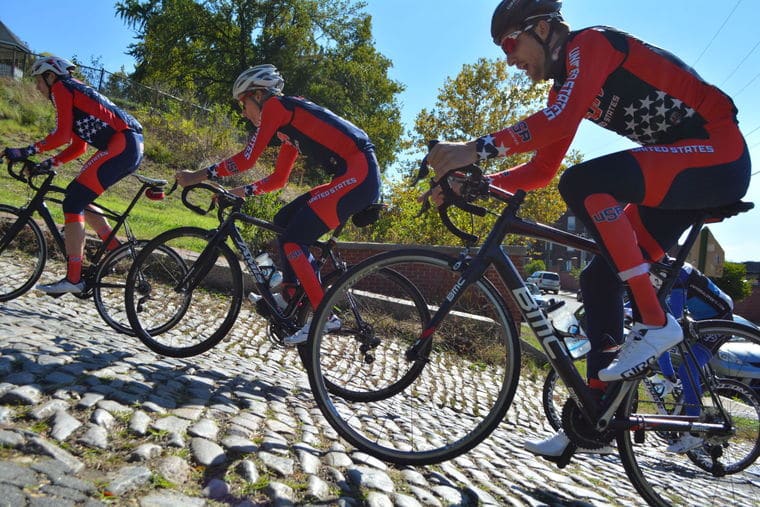This weekend sees the annual bike race that is like no other. The UCI Road World Championships pits nations against one another, rather than trade teams, on an unfamiliar course that has been designed specifically for the event. Race radios are banned and national/trade-team loyalties are tested.
The men will race 16 laps of a 16.5km circuit around downtown Richmond, Virginia. The women will do 8 laps. The course has a bit of everything; cobbled climbs, many 90-degree and two 180-degree turns, pitches of 19% and off-camber sections.

In total, the men will climb 3,808 metres, the women 1,904 metres. But don’t be fooled – this is not a climber’s course (just this morning it was announced the Yates twins will not be representing Great Britain). Adam Yates is now racing in place of Geraint Thomas who has withdrawn due to fatigue. And Simon may be brought in to replace Mark Cavendish who is out due to injuries sustained in a crash in the Tour of Britain. This is a race for a sprinter who can climb or a climber who can sprint. An all-rounder. A rider who excels in the spring classics; races with countless cobbled climbs and distances north of 250 kilometres.
In the men, think Alejandro Valverde (who, remarkably, has won six medals in the road race but not one gold), Peter Sagan, Greg van Avermaet, John Degenkolb, Julien Alaphilippe, Zdenek Štybar and Simon Gerrans. In the women’s race, Lizzie Armitstead, Pauline Ferrand-Prévot and Elisa Longo-Borghini all have a decent chance.
Team size also plays a part. The top ten nations field teams of nine riders while the weakest nations get only three spots. Theoretically, the bigger teams should have a big advantage, as they can dictate the pace and leaders can have access to more help as it’s needed. But theory doesn’t always give us the answers. Both Rui Costa (2013) and Thor Hushovd (2010) won the rainbow stripes on three-man teams.
The race can often herald the dawning of a champion. For example, Óscar Freire won his first of three championships in 1999 at the age of 23 (and bought his grandmother an elevator for her apartment with his winnings). And just last year, Michal Kwiatkowski kicked off what promises to be a big career. But the championships can also provide a fitting end to a rider’s time in the peloton, such was the case with Paolo Bettini who won in 2007, his penultimate year of racing.
It’s a wide open race but by virtue of its length and the amount of climbing, there is rarely an undeserving winner. Seven hours in the saddle requires riders to conserve energy, so along with being able to sprint and climb, the winner also needs to be tactically strong, conserve energy and probably have a little luck.
If you’re fortunate enough to be at the event, be sure to check out Mummu Cycling’s booth at FanFest. Mummu have partnered with the organisers to coordinate the travel logistics for over 1,000 cyclists, team members and officials. Mummu can help you organise your next cycling holiday to events such as the World Championships and the Tour de France.
By Laurence Guttmann



